Investigating Connections Between Leadership Emotions
Added on 2020-06-04
22 Pages8095 Words55 Views
Investigating connections between leadershipemotions and the quality of school leadership
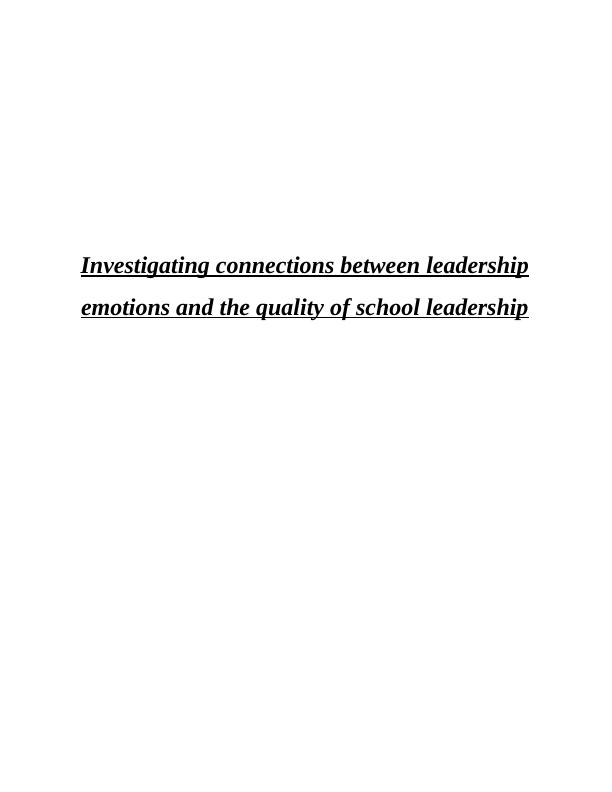
Table of ContentsINTRODUCTION...........................................................................................................................1TASK ..............................................................................................................................................2Leader's Emotion.........................................................................................................................3Leader's Emotion and Gender.....................................................................................................7CONCLUSION..............................................................................................................................16REFERENCES..............................................................................................................................19
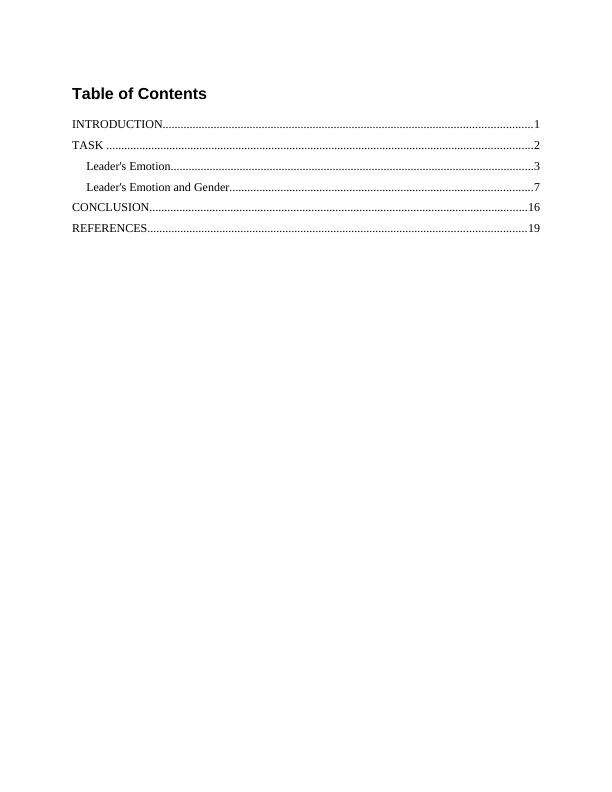
INTRODUCTIONEmotional intelligence is also described as emotional quotient which states capacities ofindividuals so they can easily recognise their own emotions and also emotions of other persons.This factor is related with analysing feeling of persons so his behaviour can be easily recognisedand accordingly work can be assigned to him. Emotional intelligence is one of the mostimportant skills of a leader according to which they controlling are controlling all theiremployees (Antonakis and Day, 2017). The major factor of emotional intelligence is linked withdeveloping self awareness in which person should have the ability to understand what they aredoing and how their activities are affecting other people at work place, motivating employees inorder to achieve all their assigned goals and targets, social skills is linked with communicatinginformations to other employees effectively in order to develop strong relations and empathy isrelated with understanding situations of other persons in order to earn respect from otheremployees at work place. Emotional understanding is also related with analysing emotions ofother persons in order to assign them work so they can easily perform all the assigned work. Leaders should have the capabilities to analyse emotions of other persons so they caneasily develop their skill and this process is termed as emotional awareness. This is an importantfactor in order to analyse the current knowledge of persons thus developing strong and effectiverelations which are important factor by which person can grow by resolving conflictingsituations in most effective and planned ways (Batool, 2013). Leaders are sometimes more intouch with employees as they are having emotional relations. The factors which are linked withemotional intelligence are important in developing skill and capabilities of people so they caneasily achieve growth and success in their overall business operations. This is the most importantfactor by which people achieve growth and success in their overall business operations. Emotionis the most important factor for leaders as it results in analysing the emotions of persons whichare attached with the work that is executed by them and this is an important and most beneficialaspect which is helpful in order to achieve success in their business operations.Emotional Literacy are the most important terms which are used in order to describeskills and abilities of person by which they can effectively carry out their assigned work (Bolmanand Deal, 2017). The factor which are related with emotional literacy involves developing selfawareness so that feelings of other persons can be easily recognised and the doubt can be easilycleared. Emotional Literacy are important factors in order to know the feelings of other persons1
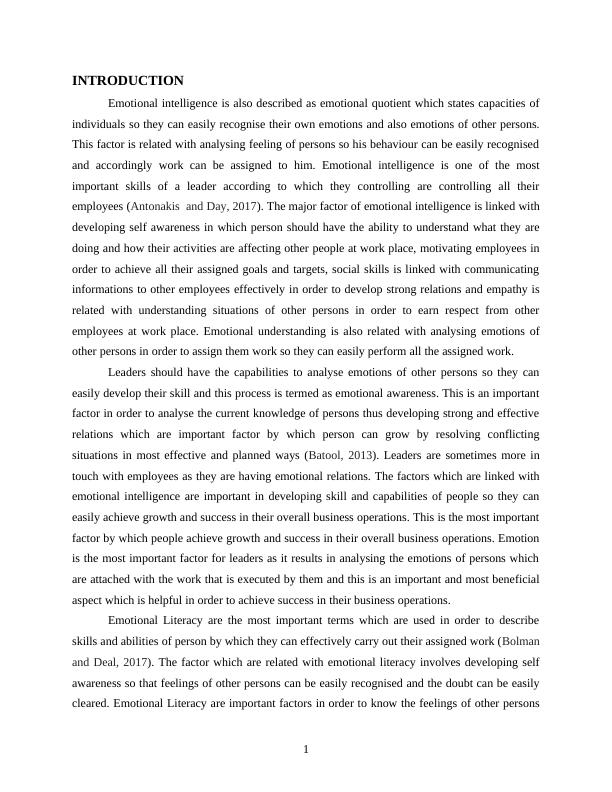
and according they should be treated thus making them feel happy in their operations which arebeing performed by them.TASK Emotional IntelligenceEmotional intelligence are intangible aspects. Its affects behaviour, thinking and decisionof leaders. Emotional intelligence made up with two primary competencies one is personalcompetence and second is social competence. In personal competence, the person traits like selfawareness, self regulation about values and accountability, motivation toward goals, empathywith others and self management skills (Cakir, 2012). In social competence, social awarenessand relationship management are two main social elements. Leaders are using social skillselement of emotional intelligence for best communication. With communication leaders resolvethe problem of conflict and improve efforts. Social awareness create knowledge of companysurroundings so, that leaders know where the communication is breaking and improve theirsocial culture environment. Customers have different social culture environment in various citiesand countries so, that leaders know customers social environment for selling their producteffectively. Good relationship management are key of leadership success. Relationshipmanagement create loyalty between team and leaders (Cameron, 2012). Emotional intelligenceare important factor for leaders for creating good relationship with employees as well ascustomers and it will help in increasing profitability within a company. A good leaders havegreat understanding of their emotions and action and it directly affect people around them. Emotional UnderstandingAll people have feelings and emotions toward things that happen in environment. Humanbehaviour build with perceptual experiences, thinking and emotions. Emotions give informationabout goals and need (Collie, Shapka and Perry, 2012). Emotions have two types one is positiveand second is negative. Negative emotions create avoidance and positive emotions createopportunities. Most of emotions are influenced by environment so that emotions come and gothroughout the day, through out week and so on. Emotion are not good or bad only action wouldtaken from emotion. Emotion depend on situation so, its changes with change in situations. Oneswhen leaders understanding their own emotions then they will understand others feeling andsituations so that it help in resolving problems of workers. A leader with strong emotions arecapable to understand how to react in situations so that result should be positive. Every person2
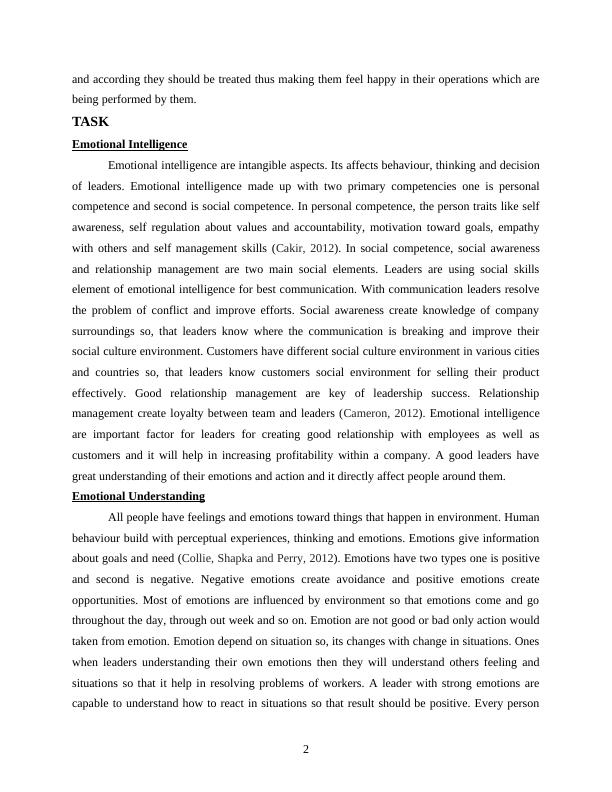
are different so that their emotions are also different, in every organisation management want tounderstand their employees emotions separately so they can full fill all emotional requirementsof employees and make organisation emotionally healthy. In an healthy environmentorganisation receive positive outcomes.Emotional LiteracyEmotional literacy is ability to understand and express feeling. Its involves self awarenessand recognition of own feeling and knowing how to manage them (Curtis, de Vries and Sheerin,2011). Emotionally literate people are able to apply self discipline in order to harness theiremotions and reach their personal goals. Emotional literacy are very important for social andemotional growth of leaders. Its help to understand and express to improve personal self esteem.Recognition of needs for impressive team work can develop emotional literacy as important astechnical competence. Most of leaders are trained themselves for understanding emotionalbehaviour of others so that they can handle accordingly. Emotions can express directly orindirectly, directly through communication and indirectly through behaviour and action insituations. So that leaders know both way of expressions. Emotional literacy create theawareness of emotional stability, how emotional stability is important for any one, emotionallyunstable person are not able to manage situation in result of team conflicts are create. Emotionalliteracy is a training part of the human resource department in any organisation, its helpmanagement for understanding their employees emotions and help them to make their employeeemotionally stable (Day, 2011). In all organisation emotional literacy is very important formanagement. The leaders are literate themselves with experience and support others.Leader's EmotionLeader's Emotions: Leadership is an art of motivating a group to work together forachieving a common goal. It is the capacity to translate vision into reality, to influence others byinspiring motivation with passion produced by a conviction and ignited by a purpose. A leader is a person who leads the group of an organisation and knows the way to achieve therequired goals. Leaders have a deeper and more lasting influence on organisation and providemore comprehensive environment where people can work together.According to Fisher, emotions can be defined as the factors which are interlinked withcognitive and physiological process, the feelings experienced, interpreted, controlled and3
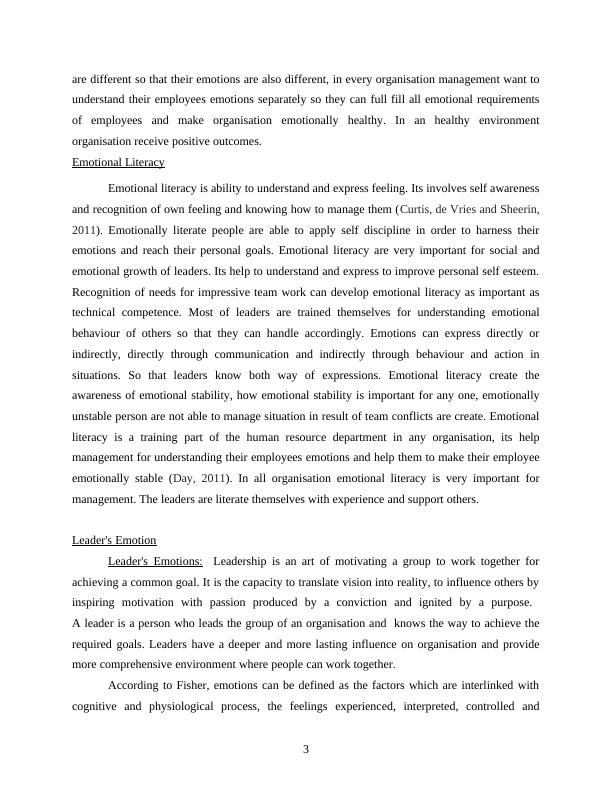
expressed. Leadership is an emotional process where leaders display emotions and attempt toraise emotions in their team members (DuFour and Marzano, 2011). Managers always supposedto be unemotional and must have a rational attitude as emotions in any organisation are seems tobe political. An effective leader is able to express emotions in order to connect all the teammembers of an organisation but his emotions are always under control, he knows what and howmuch to express among their employees. Effective managers or leaders are always able to tuneinto use their knowledge and experience to make effective decision. They are always aware oftheir responsibilities towards staff, employees, clients and the organisation. Emotions are criticalto everything that a leader can do to build trust, set a vision, maintaining and strengthenrelationship, make tough decision and learn from failure. Emotional intelligence (EI) is the cornerstone of every decision which is implemented atwork place. To solve problems and make judgement are part of a leader's systems of values andbeliefs. School leaders have always used this EI to make decisions that effects their organisation(Fernandez, Salamonson and Griffiths, 2012). Emotionally intelligent leaders use self-generatedsense to understand their employees emotions and to appreciate them for their work that requiresmutual trust when an organisation faces challenges. Its relevance that school leadership is animportant factor. Good communication is a critical feature of any enterprise where people workwith a common purpose. The effective communication is either an implicit or explicit feature ofleadership. School leadership are hired and retained on the capacity to buffer teachers fromoutside interference. There are five key elements to it: self-awareness, self-regulations,motivation, empathy and social skills. Great leaders have the ability to read people's need,desires and understand empathy. Leaders emotions play an important role, it shows hiseffectiveness, attractiveness to his followers. Leaders who feel excited, enthusiastic and energeticare likely to similarly energise their followers as a leader's sad expression make them feel lessenthusiasm and more fatigue. But as every reaction has positive or negative impact and this canaffect the overall success of the company, thus effective leaders are able to manage theiremotions, acutely self-aware, can manage their own moods and feelings, take proper decisionand look for proper solution if problems assist instead of looking to blame and dodgeresponsibilities.4
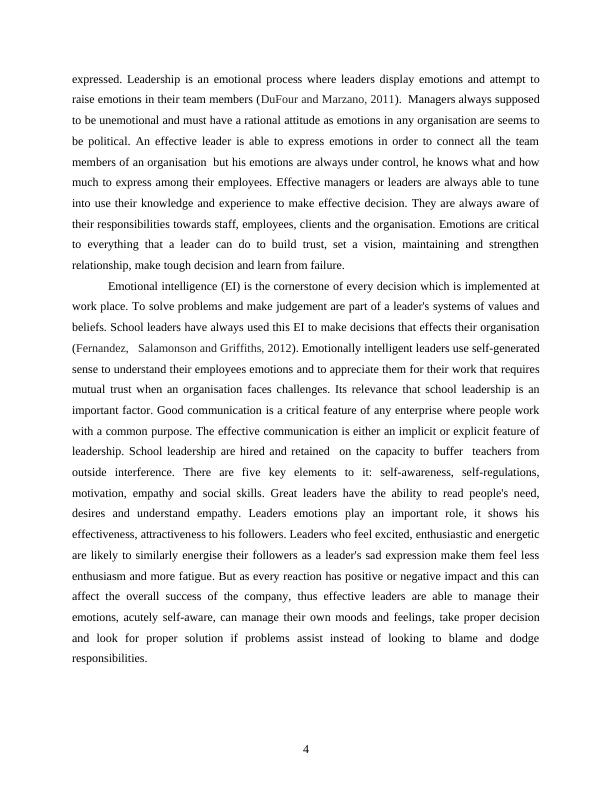
End of preview
Want to access all the pages? Upload your documents or become a member.
Related Documents
Emotional Intelligencelg...
|7
|1540
|274
BCOM101 Business Communication : Emotional Intelligencelg...
|11
|2612
|66
Leading Strategic Decision Making Case Study 2022lg...
|8
|2640
|15
Development of Authentic Leadershiplg...
|12
|3887
|44
Learning About Emotional Intelligence for Improving Professional Relationshipslg...
|8
|1738
|79
Importance of Employee Autonomy, Emotional Intelligence and Group Member Roles in Managementlg...
|6
|1343
|267
